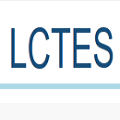计算机类 | CCF推荐期刊专刊信息5条
计算机体系结构,并行与分布式计算
Journal of Systems Architecture
Special Issue on Languages, Compilers an Tools for Embedded Systems (SI:LCTES18)
全文截稿: 2018-09-15
影响因子: 0.913
CCF分类: B类
中科院JCR分区:
• 大类 : 工程技术 - 4区
• 小类 : 计算机:硬件 - 4区
• 小类 : 计算机:软件工程 - 4区
网址: http://www.journals.elsevier.com/journal-of-systems-architecture/
The ACM SIGPLAN/SIGBED Conference on Languages, Compilers and Tools for Embedded Systems (LCTES 2018) was held on June 19-20, 2018 in Philadelphia, PA, USA. This special issue in the Journal of Systems Architecture will consider peer-reviewed journal versions of top papers from LCTES 2018, as well as other papers received from the open call.
Embedded system design faces many challenges both with respect to functional requirements and nonfunctional requirements, many of which are conflicting. They are found in areas such as design and developer productivity, verification, validation, maintainability, and meeting performance goals and resource constraints. Novel design-time and run-time approaches are needed to meet the demand of emerging applications and to exploit new hardware paradigms.
This special issue solicits papers presenting original work on programming languages, compilers, tools, theory, and architectures that help in overcoming these challenges. Research papers on innovative techniques are welcome, as well as experience papers on insights obtained by experimenting with real-world systems and applications.
We solicit original papers on the following topics of interest related to LCTES:
- Programming language challenges
- Compiler challenges
- Tools for analysis, specification, design, and implementation
- Theory and foundations of embedded systems
- Novel embedded architectures
- Mobile systems and IoT
- Empirical studies and their reproduction
计算机体系结构,并行与分布式计算
Journal of Systems Architecture
Special Issue on Mobile Edge Computing For Autonomous Driving (SI: MECAD19)
全文截稿: 2018-09-30
影响因子: 0.913
CCF分类: B类
中科院JCR分区:
• 大类 : 工程技术 - 4区
• 小类 : 计算机:硬件 - 4区
• 小类 : 计算机:软件工程 - 4区
网址: http://www.journals.elsevier.com/journal-of-systems-architecture/
Autonomous driving technology can cause fundamental transformations to the transportation industry in the near future. While autonomous driving can be achieved with an isolated vehicle equipped with on-board processing computers running perception, sensor fusion and vehicle control algorithms, driving performance can be improved tremendously using cloud computing through data aggregation and streaming data analytics. However, wireless network bandwidth is often the performance bottleneck of cloud computing for connected vehicles if large amounts of data are transmitted. To alleviate the network performance bottleneck, Mobile Edge Computing (MEC) is gaining increasing importance in recent years which brings processing from centralized cloud to distributed edge devices close to the vehicles. Non-functional requirements, such as reliability, timing, power and energy consumption are crucially important in this application.
We solicit original and unpublished papers on the following topics of interest related to MEC:
- Edge computing paradigms for autonomous driving
- Edge computing architecture for on-board terminals in autonomous vehicles
- Collaborative edge computing in cloud for autonomous driving
- Energy management of edge computing for autonomous driving
- Sensor fusion in edge computing for autonomous driving
- Edge computing in V2X communication for autonomous driving
- Distributed and online resource management for edge computing
计算机网络
Computer Networks
Special Issue on Machine Learning Algorithms for Mobile Edge Computing and IoT
全文截稿: 2018-10-31
影响因子: 2.522
CCF分类: B类
中科院JCR分区:
• 大类 : 工程技术 - 3区
• 小类 : 计算机:硬件 - 3区
• 小类 : 计算机:信息系统 - 3区
• 小类 : 工程:电子与电气 - 3区
• 小类 : 电信学 - 3区
网址: http://www.journals.elsevier.com/computer-networks
The Internet of Things (IoT) is the inter-networking of various physical devices, objects, and people. It progressively advances and covers a variety of wired and wireless technologies through embedded devices, smart objects, and smart users. The integration of these technologies along with the rapid development in Wireless Sensor Networks (WSN) based on new Bluetooth standards, such as Bluetooth Low Energy (BLE) 4.0 and ZigBee, opens new doors of evolving IoT in future generations of networks. Edge computing pushes the generation, collection, and analysis of data out to the point of origin, rather than to a data center or cloud. In the case of the IoT, this means it takes place at the devices and sensors. Edge computing provides a greater surface area for computation to occur. This enables data processing and analytics as well as knowledge generation to occur at the source of the data. Machine learning is a branch of artificial intelligence (AI) that focuses on enabling machines to learn for themselves without the need for human intervention or to be explicitly programmed to do so. Machine learning on IoT devices such as smartphones allows for learning secure models directly on the devices themselves, removing the need to send data to the cloud or externalize it in anyway.
Moreover, IoT devices generate a massive volume of data in a continuous manner. In general, a cluster of clouds is used to store and compute such large volume of IoT sensor data. This does create even more challenges in data storage and the integration between IoT devices. In order to overcome this problem, Mobile-Edge Computing (MEC) was developed, extending cloud-computing capabilities and services to the edge of the network. The objective of MEC is to provide smart services and applications with an improved Quality-of-Service (QoS) and reduced latency. Thus, MEC is becoming a significant platform for enabling consumer-centric IoT services and applications that demand real-world applications. The most familiar applications of MEC-enabled IoT include smart home, mobility, content distribution, smart vehicles, wearable health monitoring system, smart cities, and location-based services. The data processing and computation at MEC is much more, when compared with the operations performed on IoT devices. Machine learning algorithms have a capability to process streaming data generated at the edge of the network and IoT devices. This special issue focuses on challenges and problems in machine learning algorithms for processing and discovering knowledge patterns from IoT devices and edge of the network.
Topic includes but not limited to
• Supervised, unsupervised and reinforcement learning in MEC
• Industrial edge computing methods for IoT
• Big data processing in edge computing for IoT
• Interoperability and mobility for Edge to IoT connectivity
• Emerging Edge commuting services and applications for IoT
• New algorithms and architectures for embedded devices in IoT paradigm
• Emerging technologies and its integration with the embedded devices
• Integration of embedded devices in smart homes, smart traffic monitoring, smart health, smart education and smart manufacturing
• Machine learning algorithms for memory management in IoT
• Open standards and application programming interfaces for MEC
• Applications of Mobile Edge Computing (i.e., Content Delivery, Edge Video Caching, Mobile Big Data Analytics, Computational Offloading, Collaborative Computing)
• Dimension reduction and Information fusion in the IoT based real-time Big Data analytics
• Descriptive, diagnostic and predictive analytics in MEC
• Monte Carlo Sampling for IoT based real-time Big Data analytics
• Scalable, online, active, decentralized, deep learning and optimization in MEC
• In-memory analytical techniques and databases for IoT data analytics
• Simulating and emulating environments as well as experimental results on high quality data sensing and processing for edge computing
• Machine learning algorithms for intrusion and threat detection in edge computing
• Deep learning and online algorithms for energy efficient data sensing and processing in MEC
人机交互
Pervasive and Mobile Computing
Special issue on Blockchain Technology and Applications
全文截稿: 2018-11-15
影响因子: 2.974
CCF分类: C类
中科院JCR分区:
• 大类 : 工程技术 - 3区
• 小类 : 计算机:信息系统 - 3区
• 小类 : 电信学 - 3区
网址: http://www.journals.elsevier.com/pervasive-and-mobile-computing/
Aims and scope
In recent years, the blockchain technology is having an ever growing popularity, in particular for what concerns its application cryptocurrencies. As a matter of fact, Bitcoin is currently the most known application of the blockchain technology, and a number of alternative cryptocurrencies have been defined and are currently used, e.g., Litecoin or Monero. However, the application of blockchain is not limited to cryptocurrencies. The immutability of the transactions and the absence of trusted intermediaries make the blockchain technology suitable to be applied in many research and business scenarios, and a number of blockchains are currently available on the market. For instance, permissioned blockchains are meant to address those business scenarios where transactions needs to be private, and their processing must be executed within a predefined group of known participants. Moreover, some blockchains (such as Ethereum or Quorum) allow the execution of Smart Contracts, thus paving the way to a very large plethora of new interesting applications of the technology in several fields, such as: Internet of Things, Cyber Physical Systems, Edge Computing, Supply Chain Management, Social Networks, and many others.
The aim of this special issue is to gather latest research results concerning blockchain technology and its application on relevant scenarios, such as the ones previously listed. Researchers, experts, and scholars from both industry and academia are encouraged to present their recent achievements and research directions in this area.
Topics of interest
Topics of interest include, but are not limited to:
● Blockchain technologies
○ Blockchain foundations
○ Consensus algorithms
○ Smart Contracts
● Blockchain security
○ Attacks on blockchain based systems
● Blockchain operation and governance
○ Scalability of blockchain based systems
○ Governance models and experiences
○ Performance of blockchain based systems
○ Interoperability of blockchains
○ Blockchain standardisation
● Blockchain analysis
○ Transactions analysis
○ Smart Contracts analysis
● Identity management
○ Privacy and anonymity on blockchain
● Lightweight protocols based on blockchain
● Energy consumption issues
● Blockchain applications
○ Cryptocurrencies
○ Internet of Things
○ Smart Property
○ Cyber Physical Systems
○ Cloud and Edge Computing
○ Supply Chain Management
○ Social Networking
○ e-Health
○ Industrie 4.0
○ Media production
○ Education
○ Government
○ others
软件工程
Science of Computer Programming
Selected Papers from the 2019 European Conference on Object-Oriented Programming
全文截稿: 2018-11-16
影响因子: 0.74
CCF分类: B类
中科院JCR分区:
• 大类 : 工程技术 - 4区
• 小类 : 计算机:软件工程 - 4区
网址: http://www.journals.elsevier.com/science-of-computer-programming/
Background
ECOOP is Europe's longest-standing annual Programming Languages (PL) conference, and welcomes high quality research papers relating to the PL field in a broad sense.
For the 2019 edition of ECOOP we are pleased to announce a special issue of Science of Computer Programming in which selected ECOOP papers will be published. As well as appearing in Science of Computer Programming, a short abstract for each paper accepted to the special issue will also appear in the main ECOOP conference proceedings.
Topics
The ECOOP 2019 special issue solicits high-quality research papers describing original and unpublished results on any Programming Languages topic. The OO in ECOOP has traditionally stood for “object-oriented”. These days, while the conference absolutely welcomes papers that relate to OO, the scope of ECOOP is much broader and encompasses the Programming Languages field as a whole. Think of the conference as being called “ECOOP: the European COnference On Programming languages”.
下载Call4Papers App,获取更多详细内容!


登录查看更多
相关内容
LCTES提供了编程语言和嵌入式系统工程社区之间的链接。这些领域的研究人员和开发人员正在解决许多类似的问题,但背景和方法不同。LCTES的目的是让两个领域的研究人员和开发人员了解另一个领域的相关工作和有趣的问题,并提供一个他们可以互动的论坛。
官网链接:https://conf.researchr.org/home/LCTES-2019




